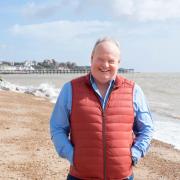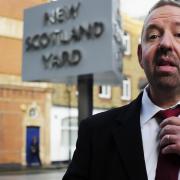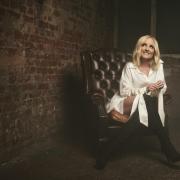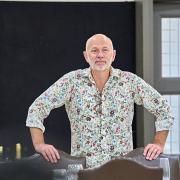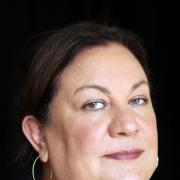The BBC’s ex-political editor and new Radio 4 anchorman Nick Robinson talks about professional and personal challenges, as he prepares for his one-man show at Bury’s Theatre Royal
If you are one of those readers who gets to their EADT Suffolk magazine early, then you are still in time to catch BBC journalist and broadcaster Nick Robinson. Not on the radio. Not on the telly. But live and in Bury.
For the BBC’s ex-political editor and current Radio 4 Today programme anchorman is starring in a one presenter show at the town’s Theatre Royal. How come?
“I was approached by the theatre due to two different connections. We have a holiday cottage in Orford and our neighbour is Judith Shallow, who is on the [Theatre Royal] board and she was probably the person who put my name forward”
“I’d also, as it happens, met the artistic director and had a couple of conversations about it, and when the invitation came I thought, I’m a lover of theatre and a great believer in local theatre outside London – so yes!”
Which goes to show that having good connections works both ways. But it will be stories of his political ones that will dominate the evening.
“I have given enough talks over the years that I’ve got some favourite anecdotes and stories that I tell. If you went through the appalling painful experience of hearing me speak several times in a row, you would definitely hear some of my favourite stories about George W Bush for example, tales of Nicolas Sarkozy and a few jokes, would you believe, about John Major!
“But what I tend to do before giving a speech, literally on the day itself, on the journey up usually, is to think what feels like now-ish, what’s relevant to today and what’s relevant to this audience. I’ll try to do that when I’m at the Theatre Royal, but, by definition, I don’t know it now!”
Robinson seems to the political and journalistic manor born. His best friend was the son of the late Brian Redhead, who fronted the Today programme in the 1980s.
“I used to go to my friend Will’s house and Brian would be there at weird times of the day and we’d have a natter, sitting on one of those kitchen stools. I remember being surprised even at that age that there was the Guardian and the Daily Mail lying around. I thought this is a journalist’s house and they’re interested in the stories rather than the political positioning of the papers.”
Redhead was frequently suspected and sometimes outright accused of political bias. That is something that Robinson too has faced, not least because he was an active Conservative whilst a student at Oxford. He describes the process when such criticisms are levelled at the BBC’s journalists.
“In the way of all large organisations there’s a moment of silence when everybody tries to work out what the official line is – are they backing you or are they sacking you?”
Robinson himself has been reported as being uneasy about the corporation’s alleged biased reporting about Labour leader Jeremy Corbyn. But he debunks these accounts.
“I never accused the BBC of bias. It was something rather different, subtly and importantly different, I would say. There is a danger of seeing the story of Corbyn, which is a remarkable story, the rise of the most rebellious MP virtually in my lifetime, in a narrow Westminster way with talk of splits and divisions in the Shadow Cabinet and the Parliamentary Labour party.
“I was trying to say to my colleagues, hold on – before you say all that – all of which is fair – just capture the moment that his election is a remarkable democratic expression of anger in the Labour Party and with the old ways of doing things. He may be capable of re-writing the old rules of politics. The future is not merely a reflection of the past, and people at home had a right to hear what his ideas were at some length before you told them that some thought it was all going to hell in a hand cart and there are terrible divisions.”
His interest in political ideas – as well as the political process – has meant that he identifies with a broad, and some would say, eclectic mix of current heroes.
“I was always a big fan of Kenneth Clarke. I like listening to him and dealing with him. He has shown courage in his very unfashionable views on Europe. Equally, in the Tory party, Iain Duncan-Smith has been brave in the opposite direction with his anti-EU views, starting from a time when it was unfashionable to be so. He has also pushed welfare reform at a time when it was seen as an obscure subject for Tories to be interested in.” And on the Labour side?
“Well, I’m a big admirer of Harriet Harman, which surprises people. Just think, in the face of ridicule at best and contempt at worst she has spent her whole life campaigning for better rights for women at a time when it was deeply unfashionable. She was attacked in the pages of some newspapers as if she was some sort of grotesque feminist harpy. Yet a lot of the things she believed in are now utterly mainstream.”
None of these three are mentioned when I ask him as to his most satisfying and most cringe-worthy interviews.
“Oh God, er, of course what you try to do is wipe out the ones that went wrong,” he prevaricates before slightly – and impressively – dodging both questions.
“The most memorable, rather than most satisfying, was the exchange with George Bush at his news conference with Blair. I asked the president, was he in denial about the war in Iraq? He was so angry about this he started to jab his finger in my direction. So cross was he that he continued to do it. He would calm down and then answer a question from someone else, and he would turn to me and point to me again and say ‘you, sir’. This phrase ‘are you in denial?’ was very controversial.
“It was a truly extraordinary moment being attacked by the leader of the free world. Meanwhile, it was a bit like being at school when you do something naughty and everyone stares at you, but in my case the people staring at me were like the director of the FBI and the vice president.” What was the backing/sacking conversation like, I wondered.
“The BBC went completely silent. I put the news report out and then nothing. I heard nothing at all. My memory is that it wasn’t until I woke up the following day and every – and this sounds immodest but it’s true – single American breakfast show was leading on the question I asked the president!” And the worst?
“I had an interview with Gordon Brown and asked him ‘are you being straight with the British electorate about the need to cut public spending?’ He never wanted to use the word ‘cut’ and he became utterly furious and enraged, and afterwards he said he’d never speak to me again. That was pretty unpleasant and the relationship was never really very good after that, which was a shame. I was sad as we’d got on perfectly well before that.”
Yet none of these challenges was as great as the cancer diagnosis he received just over a year ago. How did he cope with the terrible and cruel irony of an illness that affected his ability to talk?
“You’re right when you sum it up that way. The funny thing about it was that it was a series of steps. Because the most obvious manifestation of having been ill is the voice, I think a lot of people thought I’d had throat cancer. I actually had cancer in my lung, which was cleared up remarkably quickly and is now gone. Like any other cancer sufferer, you have to be checked all the time, but essentially the prognosis was and is pretty good.”
So what about his voice, which sounds noticeably more strained and weaker than of old?
“The voice is a by-product of the surgery and so, as a series of little steps, I was also focusing on ‘OK, just keep going, sort it out’. In a way, the fact that it happened during an election campaign that I was so keen to cover meant I just kept thinking, ‘right I’ve got to do this, I’ve got to interview the Prime Minister’. For some people I was a mad workaholic with a lack of perspective – and it is true I am a mad workaholic with a lack of perspective at times – but it gave me a perspective.
“I’m lucky I have a job I really love so I gave myself targets. People who are ill need a goal. My voice is not 100% recovered and never will be, but it seems to be good enough for me to carry on doing the job I love. A lot of people are much more unlucky than me.” w
Nick Robinson appears at the Theatre Royal, Bury St. Edmunds on Wednesday March 23 at 7.30pm. 01284 769505








